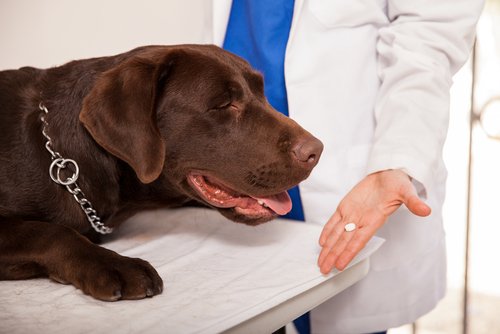The Big Debate: Do Dogs Need Prozac?

Wondering about whether dogs need Prozac is actually the same as asking if people need it. This is a controversial issue that can lead to some extreme and opposing positions. So, here at My Animals, we’ll try to find a middle ground and give you some more details about it.
Do dogs need Prozac?
Let’s start from the basis that both people and animals can experience difficulties in life. These situations may require professional help and specific treatments, including psychiatric medicine.
There are those who try to just cover up their problems, and in this case those of their pets, with pills.
And, there are also those who assume that they have to understand the causes in order to find a solution. They believe that, in order to do that, they can’t mask their problems with this type of drug.
If you’ve ever wondered if dogs need Prozac, you may not be aware of the debate that this topic has caused in recent years surrounding the psychiatric medication of animals.
Considerations when using psychiatric medication in dogs

Fluoxetine, better known as Prozac, is an antidepressant from the selective serotonin reuptake inhibitor class. Veterinarians have used it for years to treat behavioral problems in domestic dogs and cats.
However, there is still an open debate about how we should treat our pet’s behavioral inconveniences. Remember, these behaviors are often a result of something a human did.
One side of the debate comes from animal defense associations that are opposed to trying to chemically change a pet’s behavior, even if it bothers its owner. They argue that these behaviors can be solved using proper exercise.
Even those who side with its use say that it should only be used if the diagnosis is accurate, and the medication is accompanied by other treatments.
On the other hand, many people justify its use. Their argument is that it keeps owners from putting their animals down or abandoning those that have behavioral issues (destructive behavior, aggression, etc.).
Cases in which Prozac is used
Overall, using Prozac and other psychiatric drugs in dogs has produced positive results with the following:
- Psychodermatosis
- Obsessive compulsive disorders
- Aggression
- Traumas
- Stress
- Separation anxiety
- Fears and phobias
- Inadequate elimination (urinating and defecating in inappropriate places)
How to be sure if dogs need Prozac
The main issue here is that the dog can’t explain his problems to the ethologist or veterinarian. Keep in mind, it’s hard enough for doctors to figure out what’s wrong with their human patients, so you can imagine how difficult it is with pets.
And, you can’t forget the fact that the owner is quite possibly the cause of the pet’s behavioral problems.
Neither can the dog tell the specialist about the effects of the medications he’s taking. So, the owner has to just guess that the dog’s feeling better because he seems to be acting calmer. However, the dog might be feeling something else and he won’t be able to communicate that to us.
Obviously, there is much research that still needs to be done on this subject. That way, we’ll learn more about the benefits of psychiatric medication in pets.
What is clear is that you should never give your dog Prozac, or any other medication, without the proper medical prescription.

A debate that will stay open
The debate over this so-called ‘happiness drug’ that increases the brain’s serotonin levels, will definitely continue over time.
Ideally, we’d like to never have to ask whether dogs need Prozac to face their day to day lives.
However, as long as fundamental problems aren’t solved, this question will, unfortunately, stay in our minds.
Wondering about whether dogs need Prozac is actually the same as asking if people need it. This is a controversial issue that can lead to some extreme and opposing positions. So, here at My Animals, we’ll try to find a middle ground and give you some more details about it.
Do dogs need Prozac?
Let’s start from the basis that both people and animals can experience difficulties in life. These situations may require professional help and specific treatments, including psychiatric medicine.
There are those who try to just cover up their problems, and in this case those of their pets, with pills.
And, there are also those who assume that they have to understand the causes in order to find a solution. They believe that, in order to do that, they can’t mask their problems with this type of drug.
If you’ve ever wondered if dogs need Prozac, you may not be aware of the debate that this topic has caused in recent years surrounding the psychiatric medication of animals.
Considerations when using psychiatric medication in dogs

Fluoxetine, better known as Prozac, is an antidepressant from the selective serotonin reuptake inhibitor class. Veterinarians have used it for years to treat behavioral problems in domestic dogs and cats.
However, there is still an open debate about how we should treat our pet’s behavioral inconveniences. Remember, these behaviors are often a result of something a human did.
One side of the debate comes from animal defense associations that are opposed to trying to chemically change a pet’s behavior, even if it bothers its owner. They argue that these behaviors can be solved using proper exercise.
Even those who side with its use say that it should only be used if the diagnosis is accurate, and the medication is accompanied by other treatments.
On the other hand, many people justify its use. Their argument is that it keeps owners from putting their animals down or abandoning those that have behavioral issues (destructive behavior, aggression, etc.).
Cases in which Prozac is used
Overall, using Prozac and other psychiatric drugs in dogs has produced positive results with the following:
- Psychodermatosis
- Obsessive compulsive disorders
- Aggression
- Traumas
- Stress
- Separation anxiety
- Fears and phobias
- Inadequate elimination (urinating and defecating in inappropriate places)
How to be sure if dogs need Prozac
The main issue here is that the dog can’t explain his problems to the ethologist or veterinarian. Keep in mind, it’s hard enough for doctors to figure out what’s wrong with their human patients, so you can imagine how difficult it is with pets.
And, you can’t forget the fact that the owner is quite possibly the cause of the pet’s behavioral problems.
Neither can the dog tell the specialist about the effects of the medications he’s taking. So, the owner has to just guess that the dog’s feeling better because he seems to be acting calmer. However, the dog might be feeling something else and he won’t be able to communicate that to us.
Obviously, there is much research that still needs to be done on this subject. That way, we’ll learn more about the benefits of psychiatric medication in pets.
What is clear is that you should never give your dog Prozac, or any other medication, without the proper medical prescription.

A debate that will stay open
The debate over this so-called ‘happiness drug’ that increases the brain’s serotonin levels, will definitely continue over time.
Ideally, we’d like to never have to ask whether dogs need Prozac to face their day to day lives.
However, as long as fundamental problems aren’t solved, this question will, unfortunately, stay in our minds.
This text is provided for informational purposes only and does not replace consultation with a professional. If in doubt, consult your specialist.








